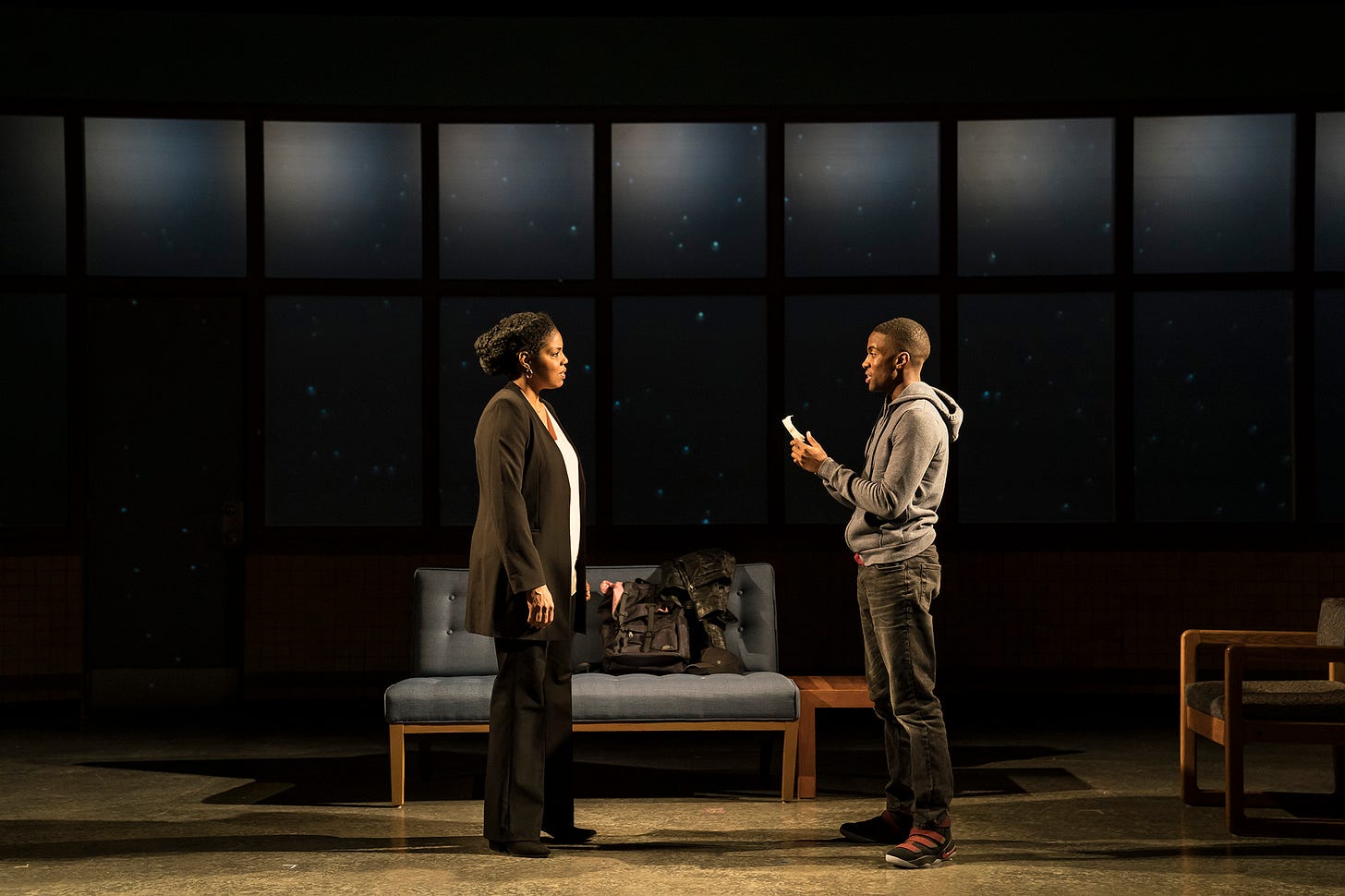SR review: “Pipeline” at Victory Gardens Theater
Dominique Morisseau’s drama about the impossible dilemma of young people of color, navigating systems they didn’t create, doesn’t always cut deep
You’re reading an exclusive review for paying subscribers to Storefront Rebellion, a new endeavor in Chicago theater reviewing from longtime critic Kris Vire. Have feedback for me? Reply to this email or find me on Twitter at @krisvire.
Dominique Morisseau’s drama about the impossible dilemma of young people of color, navigating systems they didn’t create, doesn’t always cut very deep
Theater review by Kris Vire

Tyla Abercrumbie and Matthew Elam. Photograph: Liz Lauren
The title of Dominique Morisseau’s 2018 drama, the playwright has said in interviews and on social media, refers to the “school-to-prison pipeline.” To cannibalize the way I described it in this month’s Chicago magazine, it’s “the idea that discriminatory disciplining in schools helps funnel disadvantaged youth into the criminal justice system.”
You won’t find anything as direct as that metaphorical conduit in Morisseau’s script, however; in fact, the phrase never appears in the play, which plunges us right into the deep end to convey the ever-present anxiety of being a teenage boy of color like Omari (Matthew Elam), simmering with a confusing and inherited rage for which there’s no acceptable outlet. Or being like his mother, Nya (Tyla Abercrumbie), who feels helpless to safeguard her son against the societal forces that are all too ready to criminalize him.
Nya is a high-school English teacher at a struggling public school in an unnamed big city, but she and her ex-husband have sent Omari off to a private boarding school, where he ostensibly has a chance at a “better” education but instead feels isolated. As the play opens, he’s in danger of being expelled from school and charged with assault for shoving a teacher.

Matthew Elam and Aurora Real de Asua. Photograph: Liz Lauren
The incident occurred during a class discussion of Richard Wright’s Native Son; in Omari’s telling, the teacher insinuatingly singled him out, as the class’s only black student, to explain what might have led the novel’s black protagonist Bigger Thomas to his violent actions. Some of Omari’s classmates captured the altercation on video, and he knows exactly how it’s likely to be seen online and out-of-context.
When Nya gets the news about Omari’s situation, she happens to be teaching her own students the Gwendolyn Brooks poem “We Real Cool,” devastating in its brevity, about young men destined for short lives. Reaching its final line, “We die soon,” Nya has a vision of Omari living out its premise.
Pipeline’s themes are vital, but Morisseau’s plotting can feel lacking in specifics. We’re repeatedly told that Omari’s in danger of expulsion because this was his “third strike,” leaving us to wonder what came before. The timeline is tough to parse, both for the scenes we see play out and the backstory that’s alluded to—did Omari’s parents divorce a few months ago or five years ago? Does the play take place over two days or ten?

Tyla Abercrumbie and Matthew Elam. Photograph: Liz Lauren
It’s also hard to shake the feeling that Morisseau is showing us aftermath instead of action: We’re always hearing her characters talk about things that happened earlier, offstage. (I had a similar mild gripe about Morisseau’s Paradise Blue a couple of years back.) And there’s a somewhat self-conscious poeticism to the language in places, as if trying to live up to the repeated invocations of Brooks and Wright. The scenes involving Omari’s prep-school girlfriend Jasmine (Aurora Real de Asua), a Latina who also comes from a modest background and aspirational parents, have the falsest ring.
But Abercrumbie, who appeared in Paradise Blue at TimeLine and in Morisseau’s Detroit ’67 at Northlight, seems to have mastered the playwright’s rhythms; the play’s opening scene, just Nya alone onstage leaving a pair of voicemails for her son’s father, is a masterful portrait of parental distress.
And Elam, who graduated with a BFA from The Theatre School at DePaul just last spring, already felt like a talent to watch when I saw him in his only previous professional gig back in 2017, Cor Theatre’s production of Late Company, when he was still an undergrad. Elam is phenomenally confident here in a role that was originated at NYC’s Lincoln Center Theater by Steppenwolf ensemble member Namir Smallwood. (Coincidentally, a filmed version of that LCT staging of Pipeline aired on PBS last night concurrently with Victory Gardens’ opening night.
Cheryl Lynn Bruce’s staging for Victory Gardens hits the right emotional markers. But Andrew Boyce’s sparse scenic design and Liviu Pasare’s meager projections leave us wanting for visual appeal. Like Morisseau’s plot, too much is left to our imaginations.
Pipeline
Victory Gardens Theater (2433 N Lincoln Ave). By Dominique Morisseau. Directed by Cheryl Lynn Bruce.
Cast: Tyla Abercrumbie (Nya), Ronald L. Conner (Dun), Matthew Elam (Omari), Aurora Real de Asua (Jasmine), Mark Spates Smith (Xavier), Janet Ulrich Brooks (Laurie).
Designers: Andrew Boyce (scenic), Kristy Hall (costumes), Eric Southern (lighting), Josh Schmidt (sound), Eleanor Kahn (props).
Running time: 1 hour 25 minutes; no intermission. Through March 3. Tickets ($27–$60) at victorygardens.org.
Photographs by Liz Lauren.
Thanks for being an early Storefront Rebellion paid subscriber!
If someone forwarded you this email, and you’d like to support independent, ad-free coverage of Chicago theater, you can sign up as a subscriber right now:
Send your feedback and tips to kris@krisvire.com.



